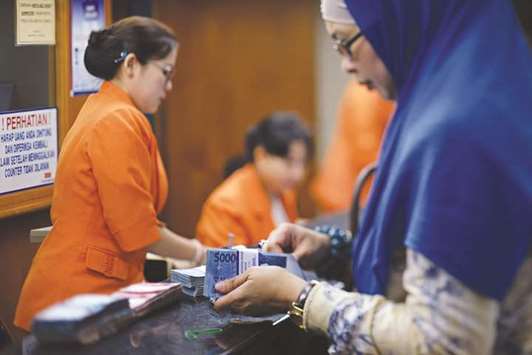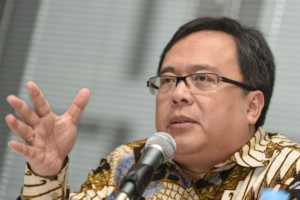
Jakarta, MINA – The world’s most populous Muslim nation, so far a laggard in developing a comprehensive Islamic finance industry, took a big leap towards the creation of a supportive framework for Shariah-compliant banking on July 27, gulf-times.com reported on Tuesday.
It was the day when the country’s President Joko Widodo inaugurated the National Committee for Shariah Finance, or KNKS for its abbreviated Indonesian name, as part of the government’s push to make Indonesia a global hub for the Islamic financial industry.
The KNKS has been tasked to accelerate, expand and develop Shariah-compliant financial services to support the country’s development, National Development Planning Minister Bambang Brodjonegoro said in a statement.
Also Read: Saudi Arabia Wins Bid to Host World Expo 2030
The ministry is the one that introduced its master plan for the development of the country’s Islamic finance future last year.
In fact, Indonesia does have some kind of a barely regulated Shariah-finance infrastructure that currently comprises 12 general Shariah banks, 22 Shariah business units of conventional banks, 58 takaful operators, 163 Shariah people’s credit banks, or rural Islamic lenders, around 5,500 rural cooperatives, seven Islamic finance-based investment firms, an Islamic microfinance portal and even one Shariah-compliant pawn shop, according to the ministry.
Some paradoxes
Also Read: 148 Products from Indonesia Promoted at Sarawat Superstore Jeddah
Paradoxically, this is the highest number of Shariah-compliant banking institutions of any country in the world. However, despite this, Indonesia’s Islamic finance sector maintained a meagre market share of just 5.3% of the country’s total banking assets as of 2016, compared to 51.1% in Saudi Arabia, 33% in Qatar, 23.8% in Malaysia and 19.6% in the UAE.
It also has just 23 million customers out of a total population of around 260mn. The reasons for the low market share are mainly the fact that there are no big Islamic banks with a strong brand name, as well as access barriers owing to a lack in Islamic banking infrastructure, poor Islamic finance literacy and little development potential due to a missing regulatory framework.
With the KNKS in place, this should now change. According to President Widodo, the industry just needed the “right push.”
“I am convinced that if the Shariah finance industry is really driven, it can be one of the main solutions in financing the development in our country, be it the people’s economic development, infrastructure, roads, bridges, ports, power plants, and in financing poverty alleviation programs, as well as reducing social inequality,” he noted.
Also Read: Packaging Industry Supports Halal Ecosystem
The planning ministry also found out that to increase demand for Islamic finance, it should push it in sectors that are traditionally related to it, namely the real estate industry.
“This is where initial demand really is,” Planning Minister Brodjonegoro said, adding that the KNKS will initially focus on developing Shariah-compliant finance solutions and a framework for the real estate sector, one of Indonesia’s industries with the currently highest growth rates where demand creation for Islamic finance should be most promising.
Another field would be a better utilisation of religious social funds, such as zakat and waqf. The planning ministry noted that there currently exist 4.3 billion square metres of waqf property in the country, the majority of which is not being utilised productively in one way or the other and also not been tapped for the improvement of the economic situation of communities in need.
Relief could be provided through new Islamic finance solutions such as waqf-backed investment funds offered to retail and institutional investors that use their proceeds to upgrade infrastructure or for the operation of schools and hospitals.
Also Read: Indonesia-Japan Agree on Energy Transition Cooperation
The next step would be to acquaint the broader population with Islamic finance by creating some form of meaningful narrative for the sector, support Islamic banks to grow bigger in size and services and develop their brand names. This could be done by executing the existing plan to merge the Islamic units of three of Indonesia’s large state-controlled banks, Bank Rakyat Indonesia, Bank Mandiri and Bank Negara Indonesia, into one large Islamic bank which then would have assets under management of $8bn and boost Indonesia’s Islamic banking market share over time.
The Islamic banking industry, then, would have the leeway to become more inclusive and able to meet the financing needs of small and medium enterprises and larger corporations, and eventually develop a blossoming Islamic capital market.
The government in Jakarta has not defined ideal targets for the sector, but the ambition is to get things on their feet by 2019 by which the market share of Islamic finance in the country should have reached a benchmark of 10%. (T/RS5/RS1)
Mi’raj Islamic News Agency (MINA)
Also Read: Dubai Expo 2020 Holds Special Event for Palestine
Istanbul: OIC communique vows to defend Al-Aqsa Mosque
Organi



























 Mina Indonesia
Mina Indonesia Mina Arabic
Mina Arabic